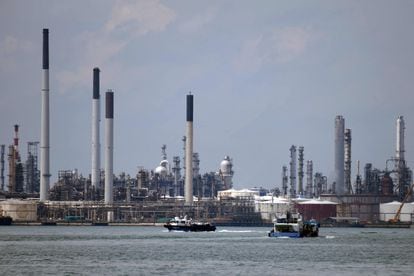A Shell refinery in Singapore in November 2020.ROSLAN RAHMAN / AFP
Two long years and 11 months.
That is the time since the last barrel of
brent
crude
it passed the $ 80 threshold for the last time.
This Tuesday, the main oil reference in Europe has once again surpassed that barrier on the back of the post-pandemic economic recovery, with growing doubts about whether the current supply - artificially limited by the OPEC cartel, the umbrella that groups together several of the largest producing countries — will be enough to fill the renewed global appetite and for much smaller stockpiles than previously thought.
Back, far behind, are those days of April of last year in which the expansion of the covid-19 throughout the world forced not a few investors to pay to get rid of the barrels they had in their portfolio and to which they couldn't get out.
More information
Lagarde defends the coordinated purchase of energy in the EU to lower prices, in line with the proposal of Spain
The light resumes its climb and will mark this Tuesday the second highest price in history
Rising energy prices cause the largest rise in industrial prices in 41 years
So far in 2021, the price of a barrel of Brent accumulates an increase of more than 50%, a figure to which must be added the increases registered in the final stretch of last year, when the incipient recovery and the positive news about the vaccine they had already started to heat up commodity markets. But in recent weeks, two more factors have been added to the dangerous cocktail of higher energy prices for the West - more inflation and a bite for consumers' purchasing power -: growing demand from China and Asia as a whole. , and a growing fear of fuel shortages in the UK that has set off alarms and triggered panic buying. One more point of imbalance in an already unbalanced market.
Despite the accumulated rise, practically no one in the market dares to end the climb. The last big name to raise its expectations for crude has been the US investment giant Goldman Sachs, which is already targeting $ 90 a barrel as the next goal on a not too distant horizon: the end of the year. "Although our view on oil has always been bullish, the current imbalance between supply and demand is greater than we had anticipated," their analysts write in a report published this Monday, hours before
Brent
surpassed the mark of the 80 dollars. "The rebound is going to continue," confirms John Driscollo, from JTD Energy Services, to AFP. "I see no evidence that it has peaked."
Neither the delta variant of the virus nor fears about the adverse effect of supply chain bottlenecks on global growth seem sufficient to ease upward pressure.
The recovery in global demand for crude oil has been "even faster than our forecasts said", complete the energy specialists at Goldman Sachs.
And the shortage of reserves pointed to by the latest readings published in some of the major countries has not helped stabilize forces in the oil market either.
Quite the opposite.
The carry-over effect of natural gas
The growth of natural gas in recent days has been the last straw for crude.
Although they are far from being perfect substitutes, given their accelerated rise in price "some Asian countries are launching to buy large quantities of crude oil to use in electricity generation plants with
fuel oil"
, explains by phone Gonzalo Escribano, specialist at the Elcano Royal Institute .
Unlike in October 2018, the last time that crude exceeded $ 80, this time the horizon looks clear of relevant geopolitical risks for producing countries.
“It is all a question of market fundamentals: much more demand, with fears about a possible resurgence of the virus very attenuated, and restricted supply due to the effects of the recent Hurricane
Ida.
on the Gulf of Mexico, with an Organization of the Petroleum Exporting Countries (OPEC) that has no incentives to increase production and is interested in high prices, and with some
fracking
producers
in the United States that are not pumping as they used to. ”Explains Escribano.
"There is some overreaction and prices may retract after winter, but until then we are likely to continue to see increases."

